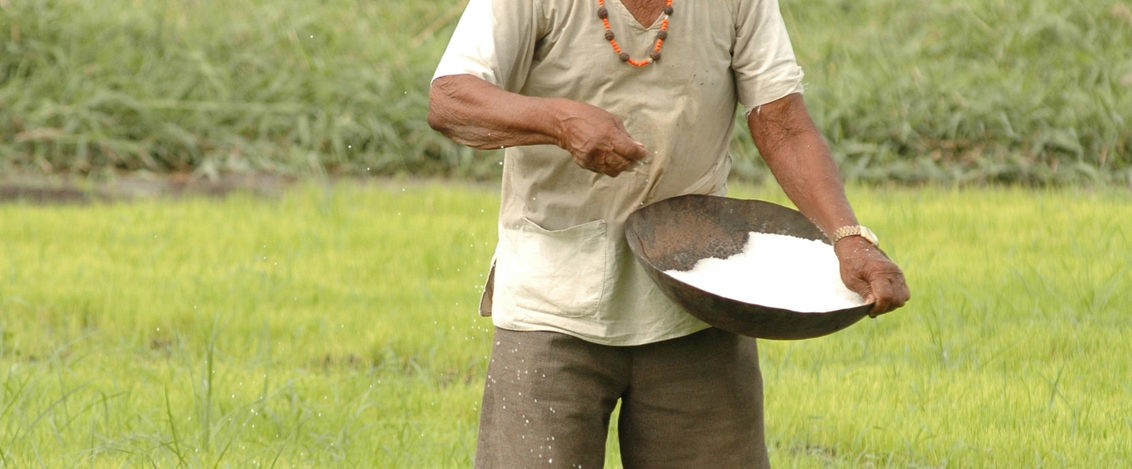
Rationalizing subsidies and investment regimes for faster, inclusive and sustainable growth.
_____________________________________________________________________________________
Reforming agriculture for faster, inclusive, and sustainable growth is critical for India in order for it to provide food, fodder and fiber for a large and growing population of 1.25 billion. Such a large populous country has to produce much of its food requirements at home, and that too in a manner that is globally competitive and environmentally sustainable. The agricultural sector contributes least to India’s GDP (around 18 percent) but it is the sector which absorbs almost half of the workforce. The average size of an Indian farm holding is just 1.15 hectares. 85 percent of its land holdings, cultivating about 44 percent of area, belong to the category of small and marginal farmers with less than two hectares of land. Also, because an average household still spends about 45 percent of its expenditure on food (NSSO, 2011), what happens to food prices impacts everyone. The World Development Report of 2008 revealed that one percentage growth in agriculture was at least two to three times more effective in reducing poverty than the same growth coming from non-agricultural sectors.
All this speaks of a much higher priority that needs to be accorded to Indian agriculture as far as public resources and policies are concerned. It is with this view that SFSA and the Indian Council for Research on International Economic Relations (ICRIER) proposed to undertake a study on 'Supporting Indian Farms the Smart Way'. The objective of the study is to measure the amount of support channelled into the agricultural sector and find ways to rationalize the subsidy so as to bring efficiency in agricultural production. The task of rationalizing subsidies is not easy since any movement towards that goal receives a huge political response. Hence, the study makes a sincere effort to understand the many complexities of the sectors and tries to suggest policy measures that can address them.
The following key issues are addressed in the study:
1. What are the main components of subsidies to agriculture? How did they behave over time? We examined the period from 2000 to 2011 for a detailed discussion. (2011 is the latest year for which relevant subsidy data are available).
2. What is the situation regarding agricultural support in some other selected countries? Did other countries’ support pattern change over time? Are developed countries really bringing down trade-distorting support? What is the magnitude of India’s product-specific and non-product-specific support?
3. What is the role of these subsidies in helping the agricultural sector?
4. What are the main problems in input sectors? What are the price policies of the inputs and how have they led to an inefficient use of resources and thus environmental consequences?
5. How can a widespread crop insurance policy and faster crop loss assessment and settlements of compensation improve the situation for a typical farmer? What is the international experience in this field?
6. How did public investments in agriculture behave over time? How does public investment compare with input subsidies in recent times? What are the marginal returns to agriculture from subsidies and investments?
7. What about China’s agricultural subsidy policy and its implications for India?
The study is based on collation and analysis of relevant information from various sources, including the government at central and state levels. Analytical methods also employ some econometric modelling to find out the marginal rates of return of the public resources going to agriculture. Policy analysis is based on best practices within the political realm of the concerned state and/or country.
This initiative has produced a series of papers. They're soon due to appear as a book. When they do, we'll add the info to our publications section. This already contains several other items on India.
Here are some outputs:
Gulati, A., Ferroni, M. and Zhou, Y. (2018), Supporting Indian Farms the Smart Way (Academic Foundation book, ISBN 13: 978-93-327-0472-5). Read the summary.
Gulati, A., Ferroni, M. and Zhou, Y. (2017), Policy Brief: Supporting Indian Farms the Smart Way
Gulati, A. (2017), Presentation: Supporting Indian Farms the Smart Way
Contact
If you would like to know more about this project, please write to Yuan Zhou
